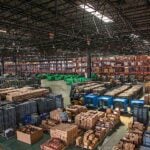With worldwide demand for uranium set to surge, according to industry statistics, it is “absurd” that Canada still restricts foreign ownership of its uranium resource. Foreign countries may not own more than 49 per cent of any uranium mine in Canada, under legislation that dates back to the cold war. But large international companies like the British-based Rio Tinto, Areva SA of France, and Paladin Energy of Australia say it is time to change that.

All three of these companies are lobbying Ottawa, and the provinces of Saskatchewan and Newfoundland and Labrador are also seeking change. Uranium produced in Saskatchewan by Cameco Corp and Aveva SA accounts for 17 per cent of the world’s output. Canada is second only to Kazakhstan for uranium production. Cameco Corp is the third largest uranium producer in the world and holds a majority (60 per cent) of a uranium mine in Kazakhstan. It also owns holdings in Australia. It has been recommended that countries that are open to Canadian investment in resources should be allowed to invest more freely in Canada.
The premier of Saskatchewan, Brad Wall, who acknowledges that uranium is a “strategic” resource, says the industry should be more open to companies around the world, but not to state-owned companies.
Wall would prefer to see the same rules apply to Canadian uranium as the federal government applied when it approved the takeover of Nexen by China’s Cnooc Ltd last year. The “net benefit” principle would allow governments to reject takeover bids by foreign entities if that takeover would not provide a net benefit to Canada. Wall’s Saskatchewan government rejected a $40-billion takeover bid for Potash Corp. by BHP Billiton in 2010, on the grounds that the deal did not meet the net benefit test.
According to the World Nuclear Association, there are 65 nuclear reactors currently under construction in the world, 167 on order or planned, and a further 317 proposed. These new reactors are expected to increase demand for uranium as they come on stream over the coming years.

































